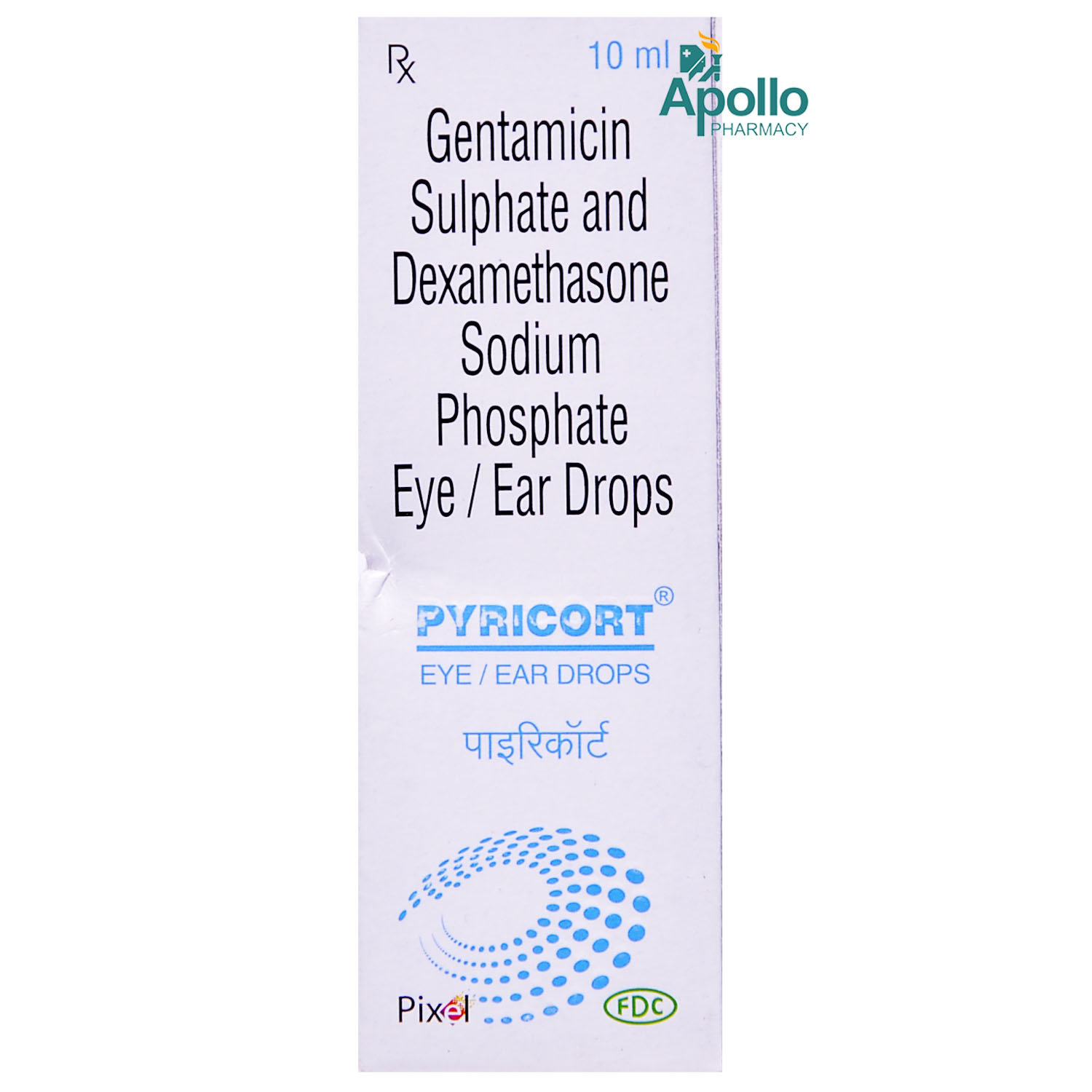Gencil-DM Eye & Ear Drop 5 ml
MRP ₹45
(Inclusive of all Taxes)
₹6.8 Cashback (15%)
Provide Delivery Location
Online payment accepted
 Prescription drug
Prescription drugWhats That
Composition :
Manufacturer/Marketer :
Consume Type :
Expires on or after :
Return Policy :
About Gencil-DM Eye & Ear Drop 5 ml
Gencil-DM Eye & Ear Drop 5 ml is a combination of a corticosteroid and an antibiotic that is used to treat eye and ear bacterial infections. Bacterial infection occurs when bacteria invade and multiply in the body.
Gencil-DM Eye & Ear Drop 5 ml contains Dexamethasone and Gentamicin. Dexamethasone belongs to the class of corticosteroids. It blocks the production of prostaglandins (chemical messengers) that make the affected area red, swollen, and itchy. Gentamicin is an aminoglycoside antibiotic that prevents the synthesis of essential proteins required by bacteria to carry out vital functions.
Your doctor will advise the appropriate dose that suits your infection. Gencil-DM Eye & Ear Drop 5 ml is for external use only. When used as eye drops, common side effects of Gencil-DM Eye & Ear Drop 5 ml include irritation, redness, burning or a stinging sensation, and temporary blurred vision. The side effects of ear drops include mild irritation, itching, and a stinging sensation. Most of these side effects do not require medical attention and gradually resolve over time. If these side effects persist longer, please consult your doctor.
Tell your doctor if you are sensitive to Gencil-DM Eye & Ear Drop 5 ml or other medications. Please inform your doctor if you have frequent ear infections, perforated ear drum, recent eye surgery, cataracts, glaucoma, severe nearsightedness, or diabetes before using Gencil-DM Eye & Ear Drop 5 ml. Pregnant and breastfeeding mothers should consult the doctor before starting Gencil-DM Eye & Ear Drop 5 ml. This medicine may cause temporary blurred vision when used as eye drops; hence drive only when alert. Gencil-DM Eye & Ear Drop 5 ml should be used for children only when advised by a doctor.
Uses of Gencil-DM Eye & Ear Drop 5 ml
Directions for Use
Key Benefits
Gencil-DM Eye & Ear Drop 5 ml contains Dexamethasone and Gentamicin. Dexamethasone is a corticosteroid that blocks prostaglandins' production (chemical messengers), making the affected area red, swollen and itchy. Gentamicin is an aminoglycoside antibiotic that prevents the synthesis of essential proteins required by bacteria to carry out vital functions.
Storage
Drug Warnings
Before using Gencil-DM Eye & Ear Drop 5 ml, let your doctor know if you have a history of eye problems (glaucoma and cataract), heart, liver or kidney diseases, frequent ear infections, perforated ear drum, recent eye surgery, severe nearsightedness, and diabetes. Avoid touching the dropper with bare hands while administering drops since it contaminates the dropper tip and solution. If you wear contact lenses, remove them while administering the medicine to the eye. It is advised to check with your doctor before using Gencil-DM Eye & Ear Drop 5 ml if you are pregnant or breastfeeding. Avoid driving or operating machines since administering eye drops may cause blurred vision for a while after use. Gencil-DM Eye & Ear Drop 5 ml should be used for children only when advised by a doctor.
Diet & Lifestyle Advise
- Manage stress, eat healthily, drink plenty of water, exercise regularly, and get plenty of sleep.
- Eat food rich in antioxidants such as berries, spinach, kidney beans, dark chocolate, etc.
- Know your allergy triggers, such as pollen, dust and other factors.
- Avoid getting things like shampoo, soap, and water into the ear, as it can cause itching.
- Do not poke or scratch the ear, as it can cause damage to the ear canal, leading to inflammation. The inflamed skin can be infected by bacteria or fungi, which can cause infections in the ear.
- Do not rub your eyes even though some ophthalmic drugs make your eye itchy.
- If you wear contact lenses: Clean and replace contact lenses more often. Never share contact lenses. Always wash your hands before inserting and removing the contact lens.
- Avoid staring at digital screens for longer durations. Rest your eyes every 20 minutes.
- Avoid or limit the intake of alcohol and caffeine.
Side Effects of Gencil-DM Eye & Ear Drop 5 ml
Eye drops:
- Irritation
- Redness
- Burning or a stinging sensation
- Temporary blurred vision
Ear drops:
- Mild irritation
- Itching
- Stinging sensation
Habit Forming
Therapeutic Class
All Substitutes & Brand Comparisons
RX
Out of StockGentadrops D Eye/Ear Drops
Chethana Pharmaceuticals
₹15
(₹2.7/ 1ml)
66% CHEAPERRX
Out of StockGlycort Eye/Ear Drops 10 ml
Torque Pharmaceuticals Pvt Ltd
₹33
(₹2.97/ 1ml)
63% CHEAPERRX
Pyricort Eye/Ear Drops 10 ml
FDC Ltd
₹33.5
(₹3.02/ 1ml)
62% CHEAPER
Author Details
We provide you with authentic, trustworthy and relevant information
FAQs
Gencil-DM Eye & Ear Drop 5 ml contains Gentamicin and Dexamethasone. It helps treat bacterial infections of the eye and ear by preventing bacteria growth and reduces the redness and itchiness in the infected areas.
It is advised to remove your contact lens if you are wearing it while administering eye drops. Also, remember to wash your hands before and after administering eye drops to avoid contamination.
If you use other eye ointments/drops along with this medicine, it is advised to maintain a gap of at least 5-10 minutes after each administration. Also, use eye drops before applying any ointments.
Apply the drops as soon as possible. However, if it is time for the next dose, skip the missed dose and return to your regular dosing schedule.
Special Advise
It is advised to contact your doctor if the infection symptoms persist or worsen after two weeks of treatment.
Disease/Condition Glossary
Bacterial eye infection: A bacterial eye infection occurs when bacteria invade any part of the eyeball or surrounding tissues, including the cornea (clear front surface of the eye) and the conjunctiva (thin membrane lining the outer eye inner eyelids). A bacterial eye infection symptoms include red eyes, pain, swelling of the eyes, watery eyes, itching, and blurry vision. Some very common eye infections are conjunctivitis (the inflammation and irritation of the eye's mucous membrane (conjunctiva), stye (bump on the eyelid), uveitis (an inflammation of the uvea (middle layer of the eye)), marginal keratitis (inflammation of the cornea), and blepharitis (inflammation of the eyelids).
Bacterial ear infection: Bacterial ear infection occurs when bacteria infect the outer or middle ear. The most common bacterial strains that cause ear infections are Streptococcus pneumoniae and Haemophilus influenza. Symptoms include earache (sharp, sudden pain or a dull, continuous pain), a feeling of fullness in the ear, ear drainage, and muffled hearing. Treatment may include over-the-counter painkillers, anti-allergic drugs, antibiotics, and steroids.

Have a query?
Alcohol
Safe if prescribed
No interactions were found.
Pregnancy
Consult your doctor
Limited data is available on the use of Gencil-DM Eye & Ear Drop 5 ml in pregnancy. Hence, if you are pregnant, consult your doctor before using Gencil-DM Eye & Ear Drop 5 ml.
Breast Feeding
Consult your doctor
There are limited studies on how Gencil-DM Eye & Ear Drop 5 ml affects breastfed infants. Please consult your doctor before taking Gencil-DM Eye & Ear Drop 5 ml if you are breastfeeding.
Driving
Safe if prescribed
Gencil-DM Eye & Ear Drop 5 ml may cause side effects like blurry vision when used as eye drops. Do not drive or operate machinery in such cases. Drive only when you are alert and have clear vision.
Liver
Consult your doctor
If you have liver problems, consult your doctor before using Gencil-DM Eye & Ear Drop 5 ml.
Kidney
Consult your doctor
If you have kidney problems, consult your doctor before using Gencil-DM Eye & Ear Drop 5 ml.
Children
Safe if prescribed
Gencil-DM Eye & Ear Drop 5 ml should be used for children only when prescribed by a doctor.









